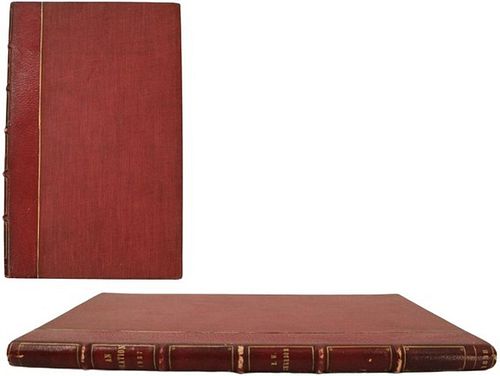Ralph Waldo Emerson, An Oration 1838
About Seller
522 South Pineapple Avenue
Sarasota, FL 34236
United States
Sarasota Estate Auction specializes in a wide variety of furniture, antiques, fine art, lighting, sculptures, and collectibles. Andrew Ford, owner and operator of the company, has a passion for finding the best pieces of art and antiques and sharing those finds with the Gulf Coast of Florida.
Two ways to bid:
- Leave a max absentee bid and the platform will bid on your behalf up to your maximum bid during the live auction.
- Bid live during the auction and your bids will be submitted real-time to the auctioneer.
Bid Increments
| Price | Bid Increment |
|---|---|
| $0 | $10 |
| $100 | $25 |
| $250 | $50 |
| $1,000 | $100 |
| $2,500 | $250 |
| $7,500 | $500 |
| $20,000 | $1,000 |
| $50,000 | $2,500 |
| $100,000 | $5,000 |
| $250,000 | $10,000 |
About Auction
Jan 20, 2024
Artists to include: Jorge Blanco, Leonardo Nierman, Picasso, LeRoy Neiman, Darrell Crisp, Francois Krige, Mino Delle Site, Peter Max, Edward Povey, Sky Jones, Robert Rauschenberg, and others. There are also 7 Original Charles Schulz Drawings done by Reuben Timmins, Production Cels, over 200 lots of Important Books and Manuscripts, Sterling Silver, a Jane Kostick Geometric Wooden Sculpture, Modern Design and Furniture, Fantastic Estate Jewelry, and so much more! Sarasota Estate Auction sarasotaestateauction@gmail.com
- Lot Description
This booklet is titled "An Oration, Delivered Before The Phi Beta Kappa Society, at Cambridge, August 31, 1837 by Ralph Waldo Emerson", it's a second edition, according to the front cover, and it was published in Boston by James Munroe And Company in 1838 and printed in Cambridge by Folsom, Wells, and Thurston. The booklet is in the original light brown paper wrappers, with the title on the front cover and repeated on the title page, it is 32 pages long, and comes in a fold-over slipcase that fits inside a beautiful crimson slipcase, and the oration is a famous speech that Emerson himself called "The American Scholar". Emerson (1803 - 1882) was an American lecturer, essayist, philosopher, abolitionist, and poet who led the transcendentalist movement of the mid-19th century. He was a champion of individualism and critical thinking, as well as a critic of conformity, and Walt Whitman referred to him as his "master". He wrote an essay in 1836 titled "Nature", and this one followed a year later. Emerson almost never gave the speech. The Rev. Dr. Wainright was supposed to give the speech and backed out, Emerson was requested to make the speech in place of the reverend, and it turned out to be one of his most influential speeches. Emerson read the speech, which lasted an hour and a quarter, in the meetinghouse at Harvard. His audience included more than two hundred Phi Beta Kappa members and some close friends and associates. The orator called for a new American thought based on intellectual self-reliance rather than the thought of the past, for a new breed of American thinker "freed from slavish devotion to inherited culture to realize his divinely inspired human capabilities". Emerson closed his address powerfully: "A nation of men will for the first time exist, because each believes himself inspired by the Divine Soul which also inspires all men." The Phi Beta Kappa oration was first published in September, 1837, in an edition of five hundred copies, all of which were sold within a month's time, and he was trying to get the audience to accept the notion of a "Thinking Man" who was not just "a mere thinker, or, still worse, the parrot of other men's thinking", but someone who could think for himself. In 1841, Emerson renamed his speech "The American Scholar", "the clarion cry, to think, to create, to become a productive scholar, and above all to fulfill yourself as an individualist." BAL 5183 Years after declaring independence, American culture was still heavily influenced by Europe, and possibly for the first time in the country's history, Emerson provided a visionary framework for escaping "from under its iron lids" and building a new, distinctly American cultural identity, and that is Emerson's legacy. The booklet measures 9 1/4 x 5 5/8 in. wide and the outer slipcase is 9 1/2 x 6 1/8 in., and the outer slipcase has five raised bands with gilt lettering and "1838" in gilt at the base and in great condition, aside from very light rubbing on the spine. The booklet has light soiling and a corner crease on the front cover, the spine is partly exposed, but does not need to be rebound, the binding inside is very intact, and aside from the brown spot on the title page and a couple of faint spots in the margins, the pages and text are clean.The back cover has light shadows and a dark spot, a chip at two tips and very light nicks along the edge, and it seems like the booklet was gently folded in half and put in someone's pocket, the way you would with a program at a football game. For a booklet almost 200 years old, it's in very good shape. The booklet is exceptionally rare, only 500 copies of the first edition were ever printed, and we've found only two copies that have been sold or offered for sale in the last three years, and they were pricey. WorldCat has no listings for the speech in any collections around the country, not before 1844 - they mention an edition of 500 copies published in London as "Man Thinking" in 1844, but none earlier, and all the other copies listed by WorldCat are ebooks or on microfilm and that's it. There is one set of books containing 32 pamphlets written by Emerson between 1822 and 1849, and those two volumes are selling for $9300; Sotheby's also offered a copy of the first edition from 1837 for sale for $3000 to $5000, and that was back in 2019, and we couldn't find any other copies listed for sale here or anywhere else, so the booklet is exceptionally rare, and we don't know for sure, but if the first edition from 1837 only had 500 copies printed and the London copy from 1844 was only published in an edition of 500 copies, is that how many were printed for the second edition of 1838? So a chance to bid on this famous speech, and a rare piece of American history that is transcendent in its own right. #15 #1666
- Shipping Info
-
SHIPPING INFORMATION·
Sarasota Estate Auction IS NOT RESPONSIBLE FOR SHIPPING. All shipping will be handled by the winning bidder. Sarasota Estate Auction recommends obtaining shipping quotes before bidding on any items in our auctions. If you are interested in obtaining any information on local shippers, please send us an email and we will kindly send you a list of local shippers. Refunds are not offered under any circumstances base on shipping issues, this is up to the buyer to arrange this beforehand.
Premier Shipping, info@premiershipment.com
BIDDER MUST ARRANGE THEIR OWN SHIPPING. Although SEA will NOT arrange shipping for you, we do recommend our shipper Premier Shipping & Crating at info@premiershipment.com You MUST email them, please do not call. If you'd like to compare shipping quotes or need more options, feel free to contact any local Sarasota shippers. You can email any one of the shippers below as well. Be sure to include the lot(s) you won and address you would like it shipped to. Brennan with The UPS Store #0089 - 941-413-5998 - Store0089@theupsstore.com AK with The UPS Store #2689 - 941-954-4575 - Store2689@theupsstore.com Steve with The UPS Store #4074 - 941-358-7022 - Store4074@theupsstore.com Everett with PakMail - 941-751-2070 - paktara266@gmail.com
-
- Payment & Auction Policies
-
Available payment options
We accept all major credit cards, wire transfers, money orders, checks and PayPal. Please give us a call at (941) 359-8700 or email us at SarasotaEstateAuction@gmail.com to take care of your payments.
-
- Buyer's Premium



 EUR
EUR CAD
CAD AUD
AUD GBP
GBP MXN
MXN HKD
HKD CNY
CNY MYR
MYR SEK
SEK SGD
SGD CHF
CHF THB
THB























